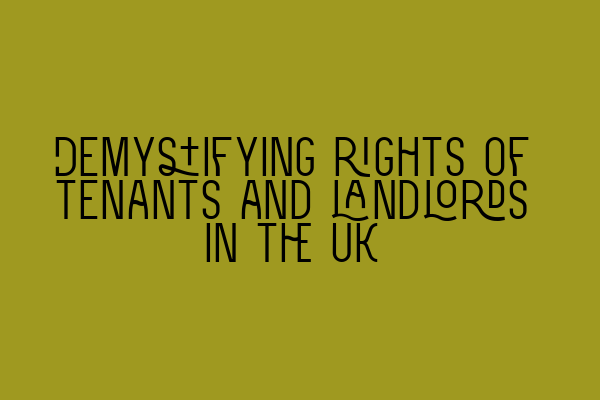Demystifying Rights of Tenants and Landlords in the UK
When it comes to renting property in the UK, understanding the rights and obligations of both tenants and landlords is crucial. Renting can sometimes be a complex process, but with the right knowledge, it can be a smooth and hassle-free experience for everyone involved. In this blog post, we will demystify the rights of tenants and landlords in the UK, shedding light on the legal framework that governs the rental market.
1. Tenants’ Rights:
As a tenant, you have certain rights that are protected by law. It’s important to be aware of these rights to ensure you are treated fairly and within the boundaries of the law. Some key rights of tenants include:
a. Right to a Written Agreement: Every tenancy must have a written agreement, also known as a tenancy agreement. This agreement sets out the terms and conditions of the tenancy, such as the duration, rent amount, and any additional responsibilities.
b. Right to Safe and Habitable Accommodation: Your landlord is legally obligated to provide you with a property that is safe, in good repair, and fit for habitation. This includes maintaining essential amenities such as water, heating, and electricity.
c. Right to Privacy: As a tenant, you have the right to privacy. This means your landlord cannot enter your property without your permission, except in emergencies or with proper notice.
d. Protection against Unfair Eviction: The law protects you from unfair eviction. Your landlord must follow the correct legal procedures and provide valid reasons if they wish to evict you.
2. Landlords’ Rights:
While tenants have their rights, landlords also enjoy certain rights and protections. It’s important to understand these rights to ensure a fair and balanced landlord-tenant relationship. Some key rights of landlords include:
a. Right to Receive Rent: Landlords have the right to receive rent payments from tenants. It is essential for tenants to pay their rent on time and in the agreed-upon manner.
b. Right to Proper Use of Property: Landlords can expect their tenants to use the property properly and not engage in any unlawful activities. Tenants should respect the property and use it responsibly.
c. Right to Recover Possession: In certain circumstances, landlords may need to recover possession of their property. This could be due to a breach of tenancy agreement or non-payment of rent. It is important for the landlord to follow the correct legal procedures for eviction.
d. Right to Inspect the Property: Landlords have the right to inspect the property periodically, usually with proper notice. This is to ensure that the property is being maintained properly and that there are no issues requiring attention.
3. Legal Framework:
The rights of both tenants and landlords are protected by various laws and regulations in the UK. Some of the key legislation governing the landlord-tenant relationship includes:
a. Housing Act 1988: This act provides guidelines for assured shorthold tenancies, which are the most common type of tenancies in the UK.
b. Landlord and Tenant Act 1985: This act outlines the rights and obligations of both tenants and landlords.
c. Equality Act 2010: This act prohibits discrimination against tenants based on protected characteristics such as disability, gender, race, or religion.
It is important for both tenants and landlords to familiarize themselves with these laws to ensure they are complying with their respective obligations and enjoying their rights.
In conclusion, understanding the rights of tenants and landlords in the UK is essential for a successful and harmonious renting experience. Tenants have the right to safe and habitable accommodation, privacy, and protection against unfair eviction. Landlords have the right to receive rent, recover possession in certain circumstances, and inspect the property. By being aware of these rights and following the necessary legal procedures, both parties can navigate the rental market with confidence and peace of mind.
If you need further legal assistance or advice regarding your rights as a tenant or landlord, do not hesitate to contact SQE Property Law & Land Law. Our team of experienced solicitors is here to help you.
